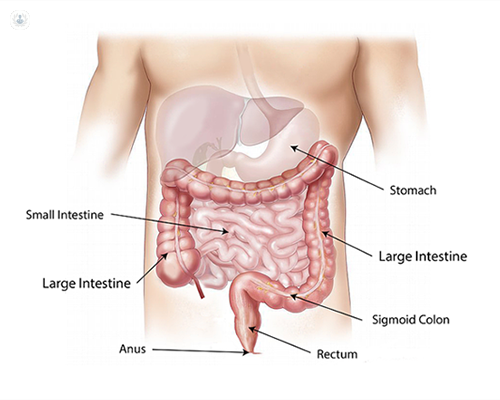Colonoscopy: How to prepare and what to expect
Written by:Patients may be required to undergo a colonoscopy to investigate a number of bowel-related symptoms, including changes in bowel habits, rectal bleeding or diarrhoea. In this informative guide for patients, revered consultant gastroenterologist Dr Imran Ghanghro shares his expert insight on colonoscopy procedures, including how to prepare, the associated risks to consider and what the recovery period entails. The revered specialist additionally sheds light on what to expect from the procedure itself and how any associated discomfort is managed.

What does a colonoscopy involve?
Colonoscopy is a camera test to look at the large intestine, also called the large bowel. This is mainly performed when people have come through a bowel cancer screening programme or have reported symptoms like diarrhoea, rectal bleeding or a change in your bowel pattern and so a telescopic examination of the large bowel is indicated.
Why would someone need a colonoscopy?
One would need a colonoscopy if they have symptoms of any bowel pathology and if their bowel cancer screening stool test is positive for blood.
How do I prepare for a colonoscopy?
Usually, the hospital sends you an information leaflet or you are seen by a doctor or a nurse who will explain all about the colonoscopy, going through the associated risks and the consent process. You will also be given information about diet (what you should and should not eat). Also, you are given a very strong laxative to be taken on the day of the colonoscopy.
People can be put under conscious sedation with a mild sedative and an injection for pain relief for the procedure itself. Alternatively, many people opt for gas and air, called Entonox, which is equally good. With Entonox, you don’t have to wait for very long after the procedure and you don’t need anybody to look after you at home.
What do you feel during the procedure?
Generally, it’s not a painful test. Occasionally, you can get a bit of an uncomfortable sensation going round the bends in the bowel. It is a safe test and although there are risks involved, the technique has become quite good in the United Kingdom and elsewhere and practitioners are well trained in performing bowel cancer screenings and colonoscopies. Naturally, it’s important to read the information provided and to go through the informed consent process for the colonoscopy.
What are the risks of a colonoscopy?
Generally, colonoscopy is a safe test and thousands are performed every year in the United Kingdom. There are small risks, which include bleeding and a tear or a perforation in the bowel which occasionally may need operations or blood transfusions. There is a small risk with sedatives and of missing something in the bowel.
However, overall, it is a very safe test. I would strongly encourage people who are experiencing symptoms like a change in bowel pattern or who notice blood in their stool to please see their GP so they can be referred appropriately.
What happens after the procedure?
If you have had sedation, you will probably be in recovery for half an hour to forty-five minutes and the recovery nurses will ensure that you’re well enough to go home. If you have had sedation, you will need somebody to take you home and look after you for a good twenty-four hours. Although it’s a generally safe recovery process, you will not be allowed to drive or drink alcohol if you have had sedation as it’s not safe and you will also not be able to sign any legal documents or operate any heavy machinery during this time.
If you have had Entonox, the recovery is quite quick. If you feel well in the recovery room and you have had something to eat and drink (patients are often offered tea and biscuits or sandwiches), you can then go home. You won’t need anybody to take you home if you have had gas and air and you can drive after thirty minutes.
If you wish to schedule a consultation with Dr Ghanghro, you can do so by visiting his Top Doctors profile.


